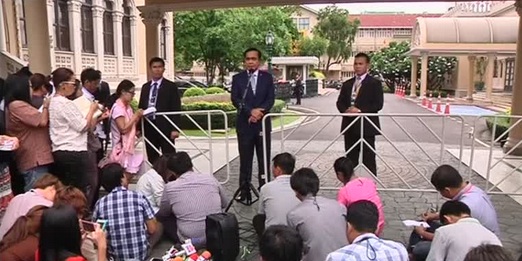
(REUTERS) Thai Prime Minister General Prayuth Chan-ocha insisted on Thursday (July 9) that Bangkok was only a middle country and the conflict should be resolved between Ankara and Beijing, after it confirmed it had forcibly returned nearly 100 Uighur migrants to China.
“We are not part of the conflict so please stop trying to get us involved with all of the conflicts. We are a middle country, no matter the case, we have to follow the international agreements,” Prayuth told reporters.
Thailand’s confirmation on Thursday has heightened tensions between Turkey and China over the treatment of the Turkic language-speaking and largely Muslim minority.
Turkish protesters attacked the Thai honorary consulate in Istanbul overnight in protest over Bangkok’s expulsion of the Uighurs, smashing windows and ransacking parts of the building.
Thailand’s embassy in Ankara warned around 1,300 Thais living in Turkey to “be on alert” following the attack. Thai Prime Minister Prayuth Chan-ocha on Thursday mooted the possibility of closing the embassy if the situation worsened.
Rights groups have expressed concern over Thailand’s decision to send the Uighurs back to China fearing they could face ill-treatment and even torture.
Hundreds, possibly thousands, of Uighurs have fled unrest in China’s western Xinjiang region where hundreds of people have been killed, prompting a crackdown by Chinese authorities. Many Uighurs have travelled through Southeast Asia to Turkey.
A group of more than 170 Uighurs were identified as Turkish citizens and sent to Turkey, and nearly 100 were identified as Chinese and sent back to China. Fifty others still need to have their citizenship verified.
“If you wonder if we have sent them back or not, we have sent them back to both places (Turkey and China). We even sent more back to the country where there’s a problem (Turkey protests). Therefore, I think this matter should be solved at a government and foreign ministry level,” Prayuth said.
Hua Chunying, a spokeswoman for China’s foreign ministry, would not confirm whether the Uighurs had been deported to China but spoke in general terms about the issue at a daily news briefing on Thursday, saying the Uighurs were “firstly Chinese”.
“In reports at the moment there is always concern about Uighurs. As I’ve said before the Uighurs are one of the family of 56 ethnicities in China. They are firstly Chinese. If Chinese people immigrate illegally I think then the Chinese side needs to increase its cooperation with the relevant country and relevant side to better protect the order of normal international exchanges of people,” Hua said.
China’s treatment of the Uighurs has aroused concern in Turkey, where many see themselves as sharing a common cultural and religious background. The Uighurs are regarded as “brothers” in Turkey, which already hosts a large Uighur community.
China is home to about 20 million Muslims spread across its vast territory, only a portion of whom are Uighur.








